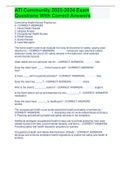Assignment 2 Semester 2024
Unique Number:
Due Date: 13 September 2024
(3 ANSWERS PROVIDED)
Sani Jacobs has a potential legal remedy against Sara-Lee’s employer, under the principle of
vicarious liability. Vicarious liability is a legal doctrine that holds employers liable for the wrongful
acts committed by their employees during the course and scope of employment. The key issue
here is whether Sara-Lee’s actions fall within the scope of her employment and whether her
employer can be held liable for the damages.
Vicarious Liability
DISCLAIMER & TERMS OF USE
1. Educational Aid: These study notes are designed to serve as educational aids and should not be considered as a
substitute for individual research, critical thinking, or professional guidance. Students are encouraged to
conduct their own extensive research and consult with their instructors or academic advisors for specific
assignment requirements.
2. Personal Responsibility: While every effort has been made to ensure the accuracy and reliability of the
information provided in these study notes, the seller cannot guarantee the completeness or correctness of all
the content. It is the responsibility of the buyer to verify the accuracy of the information and use their own
judgment when applying it to their assignments.
3. Academic Integrity: It is crucial for students to uphold academic integrity and adhere to their institution's
policies and guidelines regarding plagiarism, citation, and referencing. These study notes should be used as a
tool for learning and inspiration, but any direct reproduction of the content without proper acknowledgment and
citation may constitute academic misconduct.
4. Limited Liability: The seller of these study notes shall not be held liable for any direct or indirect damages,
losses, or consequences arising from the use of the notes. This includes, but is not limited to, poor grades,
academic penalties, or any other negative outcomes resulting from the application or misuse of the information
prov
]
, For additional support +27 81 278 3372
(3 ANSWERS PROVIDED)
Sani Jacobs has a potential legal remedy against Sara-Lee’s employer, under the principle
of vicarious liability. Vicarious liability is a legal doctrine that holds employers liable for the
wrongful acts committed by their employees during the course and scope of employment.
The key issue here is whether Sara-Lee’s actions fall within the scope of her employment
and whether her employer can be held liable for the damages.
Vicarious Liability
Vicarious liability applies when an employee causes harm or injury to a third party while
performing their job duties, even if the employee's actions are negligent. In this case, Sara-
Lee was on her way to perform audit work at the South African Broadcasting Corporation
(SABC) when the accident occurred. The critical question is whether she was acting in the
course and scope of her employment at the time of the accident.
South African case law has established several key principles concerning the application of
vicarious liability. In the case of Minister of Police v Rabie (1986), the court held that for an
employer to be held vicariously liable, the wrongful act must be committed within the scope
of the employee’s employment. In this case, Sara-Lee was driving her employer's car to
complete an assigned task, which would likely be considered as acting within the course of
her employment.
Negligence and Scope of Employment
Although Sara-Lee was negligent in driving at an excessive speed, her negligence does not
negate her employer’s potential liability under vicarious liability principles. The courts have
previously held that even if an employee acts negligently, as long as the act falls within the
employee’s scope of work, the employer can still be held liable. This is demonstrated in
Nkala v Harmony Gold Mining Co Ltd (2016), where the employer was held liable for the
employee’s negligent conduct as it occurred during the performance of their duties.
Sara-Lee's negligence, therefore, does not remove the employer’s responsibility, as she
was performing her duties at the time of the accident. The fact that she was late and
speeding to complete her work assignment may support the argument that her actions were
still linked to her employment, rather than acting for personal reasons or outside the bounds
of her job.
Legal Remedy for Sani Jacobs



